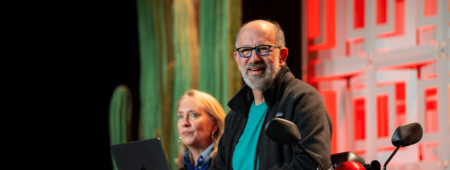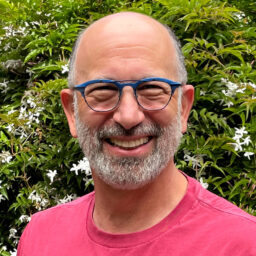
Nonprofit Founded by Hertz Fellow Helps Companies Influence Climate Policy
Hertz Fellow Bill Weihl educates employees and executives at large tech companies about how and why they and their companies should speak out about climate policies.
As a computer scientist, Hertz Fellow Bill Weihl spent the early part of his career building network systems that could reliably handle the growing demands of the early World Wide Web and dot-com boom. His job required him to think outside the box and imagine just how rapidly network requirements could change over a short time span.
Now, Weihl is tackling a different kind of exponential growth: the climate changes that are impacting the world more swiftly than ever due to rising carbon dioxide levels in the atmosphere. Once again, Weihl is thinking creatively and figuring out how to predict and solve future challenges before they arise.
In 2020, Weihl launched the nonprofit ClimateVoice, which is pushing employees and executives at large tech companies to make their voices heard when it comes to climate policy. The effort, Weihl says, relies on skills he first honed as a Hertz Fellow and fine-tuned over years working as a tech industry insider.
"Within a few years, I’d like to see ClimateVoice educate many thousands of employees at large companies, as well as hundreds of journalists, and have them encourage and pressure companies to support climate policies everywhere they operate,” says Weihl.
An Opportunity to Change the Future
Weihl grew up in Cincinnati, Ohio, and remembers being cognizant of environmental issues as a young child. But he was also drawn to other areas of science and engineering, and decided to pursue computer science as an undergraduate at the Massachusetts Institute of Technology — where he remained for graduate school, supported by a Hertz Fellowship. He studied programming languages, compilers to translate computer code between languages and different types of networked systems.
“Having the Hertz Fellowship gave me much more freedom than I would have had otherwise,” says Weihl. “It allowed me to dig more broadly and more deeply into a range of topics, giving me an unusual array of experiences.”
For the next 20 years, Weihl worked on a range of computer engineering problems within tech companies — primarily at Akamai Technologies, which was scaling up network systems to a previously unimaginable size. Weihl read about climate change challenges and technologies only as a side interest.
“My background and skill set didn’t seem relevant to working on such issues early in my career,” he says. “But the fact that I had spent two decades in a field that thrives on exponential growth allowed me to understand the science behind climate change and to distill it into a clear sense of where we might be headed.
By 2004, however, Weihl had become so concerned about climate issues — and what the future would look like for his two children — that he decided to take action. He left his job at Akamai and, in 2006 after a short sabbatical to brainstorm solutions to the worsening climate crisis, he joined Google to shape its initiatives surrounding energy efficiency and clean energy technology.
From an Insider to an Outside Influence
Weihl spent six years at Google and then six years at Facebook building sustainability programs and trying to encourage, from the inside, policies that would reduce carbon emissions by the companies themselves as well as their suppliers and customers.
“Over 12 years at Google and Facebook, I saw how much positive impact companies could have on the climate crisis — through improvements in their operations, through influencing their suppliers and through their products,” says Weihl. “But over those 12 years I also came to understand that voluntary action alone won’t decarbonize fast enough. Public policy has to play a critical role to set the rules of the market so we move quickly across the entire economy.”
Most companies, Weihl realized, rarely make their voices heard in public or take sides in major public policy debates — unless it impacts their own bottom line. He saw an opportunity to move large tech companies off the sidelines by educating, engaging and mobilizing their employees. That vision — which Weihl says was naively optimistic at the start — led to ClimateVoice.
Today, the nonprofit has already trained thousands of people and helped change the media narrative about corporate leadership on climate change, Weihl says. The actions of ClimateVoice were, in part, responsible for companies speaking out in support of the Inflation Reduction Act of 2022, which represented the single largest federal investment in climate and energy security. Large companies that in the past may not have spoken out also voiced support for state legislation in California and new SEC regulations requiring climate-change-related information to be included in SEC filings.
Taking Risks, Inspiring Others
In 2023, Weihl was diagnosed with amyotrophic lateral sclerosis (ALS), which has taken away his ability to speak. But, using an AI-powered speaking tool, he still spreads his message about the importance of large companies speaking out about climate policy.
"Even when my voice is silenced, this community will speak up and will be heard,” Weihl said — to a standing ovation — at the 2024 GreenBiz conference that brought together corporate sustainability professionals.
Weihl says that his skills and confidence at diving into new areas, learning things quickly and figuring out the most important levers to solve problems all harken back to his time as a Hertz Fellow at MIT. His time in the tech industry taught him how to work with a range of people and how businesses make decisions.
For many years, Weihl has been a consistent annual donor to the Hertz Foundation — not only in recognition of how its support helped shape his own career but also in recognition of the future scientific leaders who are still to come.
"I believe the work the Hertz Foundation does to support and encourage the development of leaders in science and technology is vital,” he says. “Hertz Fellows have been and will be at the center of improving the world and society in years to come.”
